Dr. Mardy's Quotes of the Week ("Self-Deception")
February 9-15, 2025 | THIS WEEK'S THEME: “Self-Deception"
Opening Line of the Week
A bold, emphatic assertion—on almost any topic—is generally an excellent way to begin a novel, as Goldstein masterfully demonstrates here.
For well over 2,000 memorable opening lines from every genre of world literature, go to www.GreatOpeningLines.com.
This Week’s Puzzler
On February 15, 1988, this man died at age 69 of abdominal cancer. At his death, he was the flashiest of a new generation of theoretical physicists who cut their teeth on The Manhattan Project during WWII. A New York Times obituary described him as “arguably the most brilliant, iconoclastic, and influential of the postwar generation of theoretical physicists.”
Despite his reputation—and status as a 1965 Nobel laureate—he was not well known in popular culture when, in 1986, he was asked to serve on the presidential commission investigating the Challenger space shuttle explosion. During the hearings, he stunned the nation—and embarrassed NASA officials—when he placed an O-ring seal in a glass of ice water and demonstrated its vulnerability in less than 30 seconds. If NASA scientists had performed this simple experiment, he suggested, the disaster would have been avoided.
Despite his serious scientific credentials, he was a free-spirited eccentric who enjoyed playing the bongo drums almost as much as he enjoyed playing practical jokes on colleagues. When once asked if he could explain in simple terms what he’d done to become a Nobel laureate, he said, “Hell, if I could explain it in three minutes, it wouldn’t be worth the Nobel Prize.”
In The Pleasure of Finding Things Out (1999), a collection of essays published posthumously, he wrote, “Science is a way of trying not to fool yourself.” He then added:
Who is this person? (Answer below)
What Role Has Self-Deception Played in Your Life?
In “The Fly on the Wheel,” a fable long misattributed to the legendary Aesop (for the real author, go here), a fly is sitting on the axle of a speeding chariot driven by a whip-wielding charioteer. As the fly looks at the large dust cloud in the chariot’s wake, he says admiringly, “What a dust I raise!”
It’s a wonderful fable, and readers of every age immediately grasp its meaning. The fly, who sincerely believes its tiny actions have stirred up the huge cloud, represents the many deluded people in history who have believed they are responsible for achievements that, in fact, they played no part in bringing about. The fable is also a perfect depiction of self-deception, which The American Heritage Dictionary defines as:
“The act of deceiving oneself or the state of being deceived by oneself.”
When we falsely believe something about the world—like thinking the Earth is flat or that global warming is a myth—we are not engaging in self-deception. We are simply wrong or misinformed, mistakenly believing something that is contrary to the evidence.
The essence of self-deception, by contrast, is to falsely believe that something about ourselves is true when it is not—like thinking we’re intellectually gifted when all of the evidence would indicate we’re much closer to average intelligence. In approaching the subject of self-deception, it is helpful to remember that it always involves deception, which The Merriam-Webster Dictionary defines this way:
“The act of causing someone to accept as true or valid what is false or invalid: the act of deceiving.”
This definition captures what grifters and con artists do when attempting to fleece a “mark.” The grift, which always involves two or more people, can only be accomplished if the victim can be successfully deceived. In self-deception, only one person is involved, and the role of the con artist and the mark are embodied in that single individual.
Self-deception is one of the most fascinating of all human foibles. And, as this week’s Puzzler quotation suggests, it doesn’t take much effort. The problem has been recognized since antiquity.
The problem has also been memorably described in Scripture, as we see in I John 1:8 (KJV), where John the Apostle writes:
“If we say that we have no sin, we are deceiving ourselves and the truth is not in us.”
The German philosopher Ludwig Wittgenstein once helpfully reminded us that people are oblivious to the fact that they’re deceiving themselves. For this reason, he added, we will never hear anyone say, “I falsely believe.” Wittgenstein expressed the idea in one of the most fascinating observations in my quotation collection:
Yes, I know that’s a mouthful, but bear with me for a moment because this is actually a very important thought. In plain English, Wittgenstein is saying that people think they’re correct when stating a false belief. Of course, they might say in the past tense, “I was wrong about X” or “I once believed Y, but no longer do.” But in the moment they’re expressing a demonstrably false belief, they think what they’re saying is true.
Self-deception can take many different forms, but it always has this core component: human beings are highly susceptible to believing things they want to be true. In study after study, for example, psychologists have found that over ninety percent of people believe in the statistically baffling proposition that they are above average in such things as having a good sense of humor, possessing common sense, being a good driver, and having the ability to get along with others.
These illusions get particularly interesting with self-assessments regarding intelligence and mental functioning. In one survey of high school students a few years ago, a stunning 25 percent believed they were in the top one percent of their class! The delusion is not restricted to naïve adolescents, either. I recall another study in which 94 percent of college professors believed that, when compared to their peers, they were above average.
While the kinds of personal illusions I described above are relatively harmless from a larger societal perspective, self-deception becomes a far more serious concern when we see it occurring in people who hold positions of power and influence. In fact, a case could easily be made that we’re seeing a good deal of it happening right now in Washington, DC. I won’t be discussing the matter any further here, but the eminent American historian Barbara Tuchman was clearly thinking along these lines when she wrote in The March of Folly: From Troy to Vietnam (1984):
“Self-deception…is a factor that plays a remarkably large role in government. It consists in assessing a situation in terms of preconceived fixed notions while ignoring or rejecting any contrary signs. It is acting according to wish while not allowing oneself to be deflected by the facts.”
This week, take a few moments to think about the role that self-deception has played in your life—or in the lives of people you’ve lived and worked with. As usual, let your thinking be stimulated by this week’s compilation of quotations on the subject:
The man who suspects his own tediousness is yet to be born. — Thomas Bailey Aldrich
Our greatest illusion is to believe that we are what we think ourselves to be. — Henri-Frédéric Amiel
The human mind has an infinite capacity for self-deception. — Gertrude Atherton
Narcissists alone are blatant in their self-inflation and braggadocio—leavened with a necessary dose of self-deception. — Daniel Goleman
Rationalization may be defined as self-deception by reasoning. — Karen Horney
There are certain faults which press too near our self-love to be even perceptible to us. — Hannah More
Nationalism is power hunger tempered by self-deception. — George Orwell
The illusion which exalts us is dearer to us than ten thousand truths. — Alexander Pushkin
Things are as they are, and no amount of self-deception makes them otherwise. — Agnes Repplier
Human beings have a demonstrated talent for self-deception when their emotions are stirred. — Carl Sagan
For source information on these quotations, and more observations on the theme of SELF-DECEPTION, go here.
Cartoon of the Week:

Answer to This Week’s Puzzler
Richard Feynman (1918-1988)
Dr. Mardy’s Observation of the Week
Thanks for joining me again this week. See you next Sunday morning, when the theme will be “Learning From Experience.”
Mardy Grothe
My Two Websites: www.drmardy.com and www.GreatOpeningLines.com
Regarding My Lifelong Love of Quotations: A Personal Note

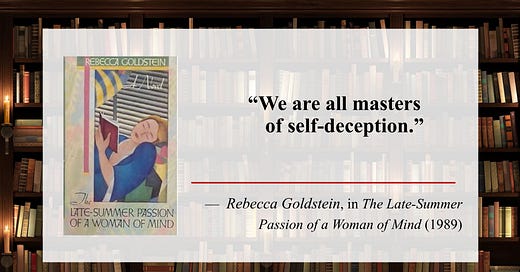



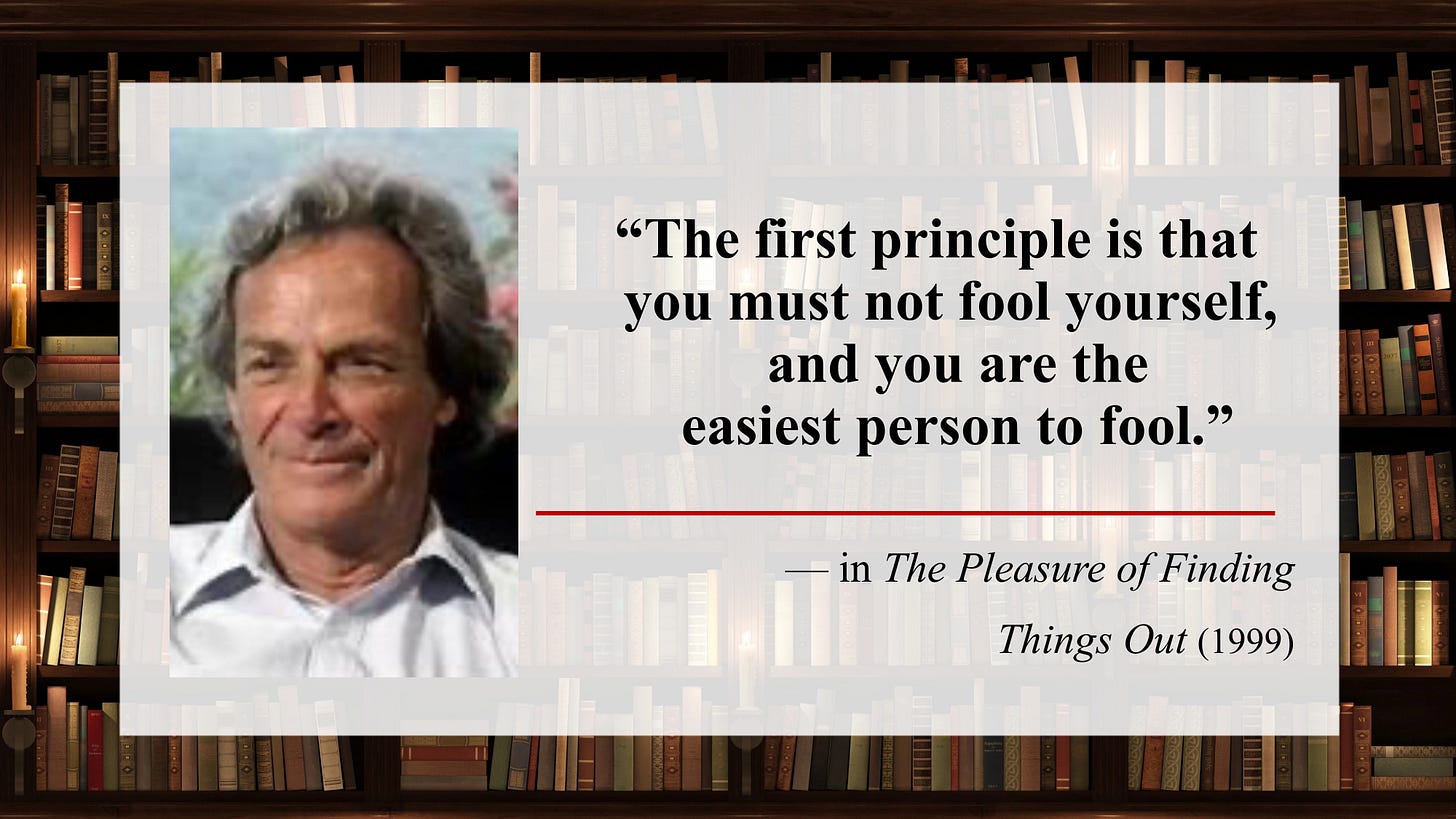

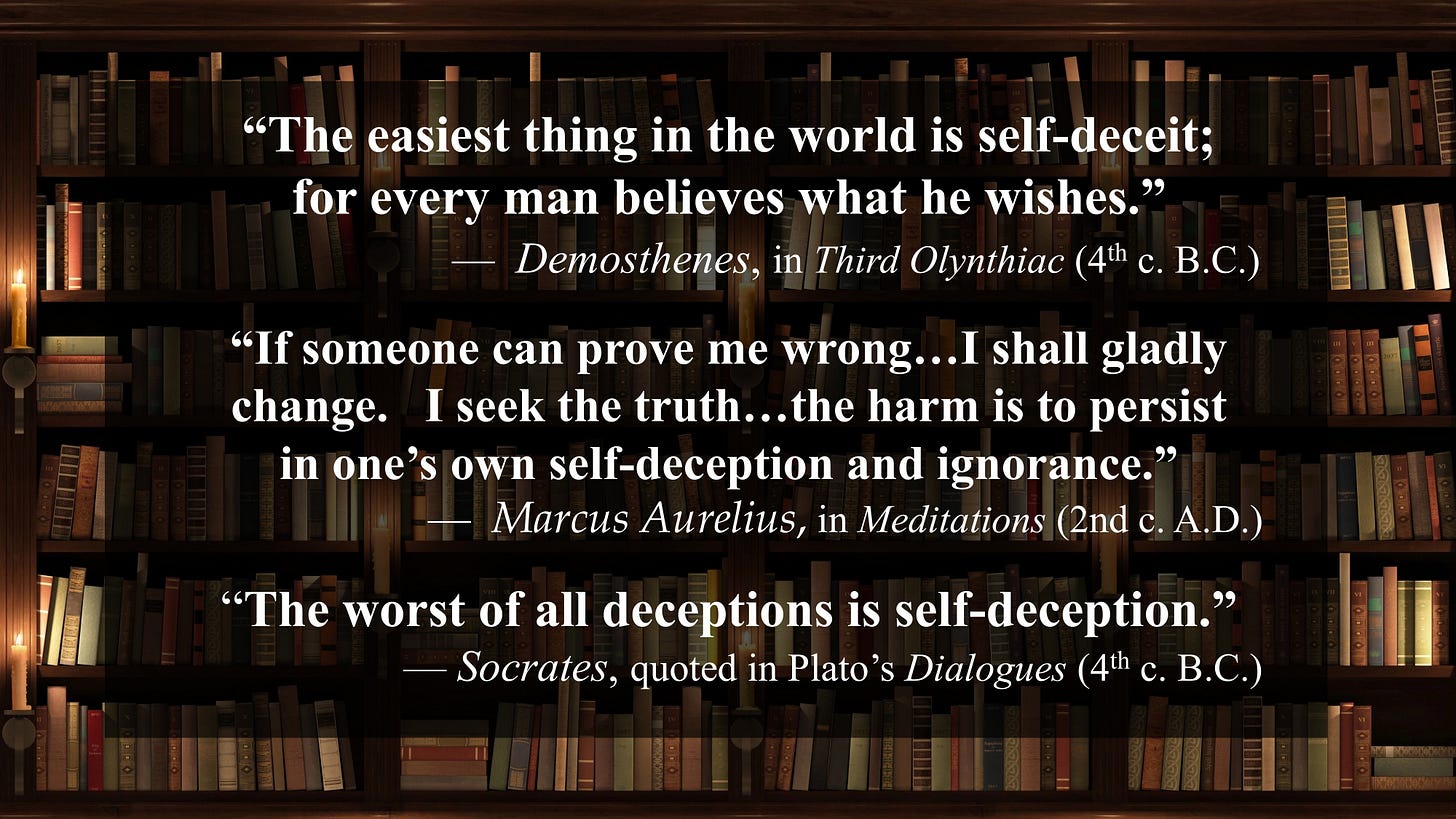
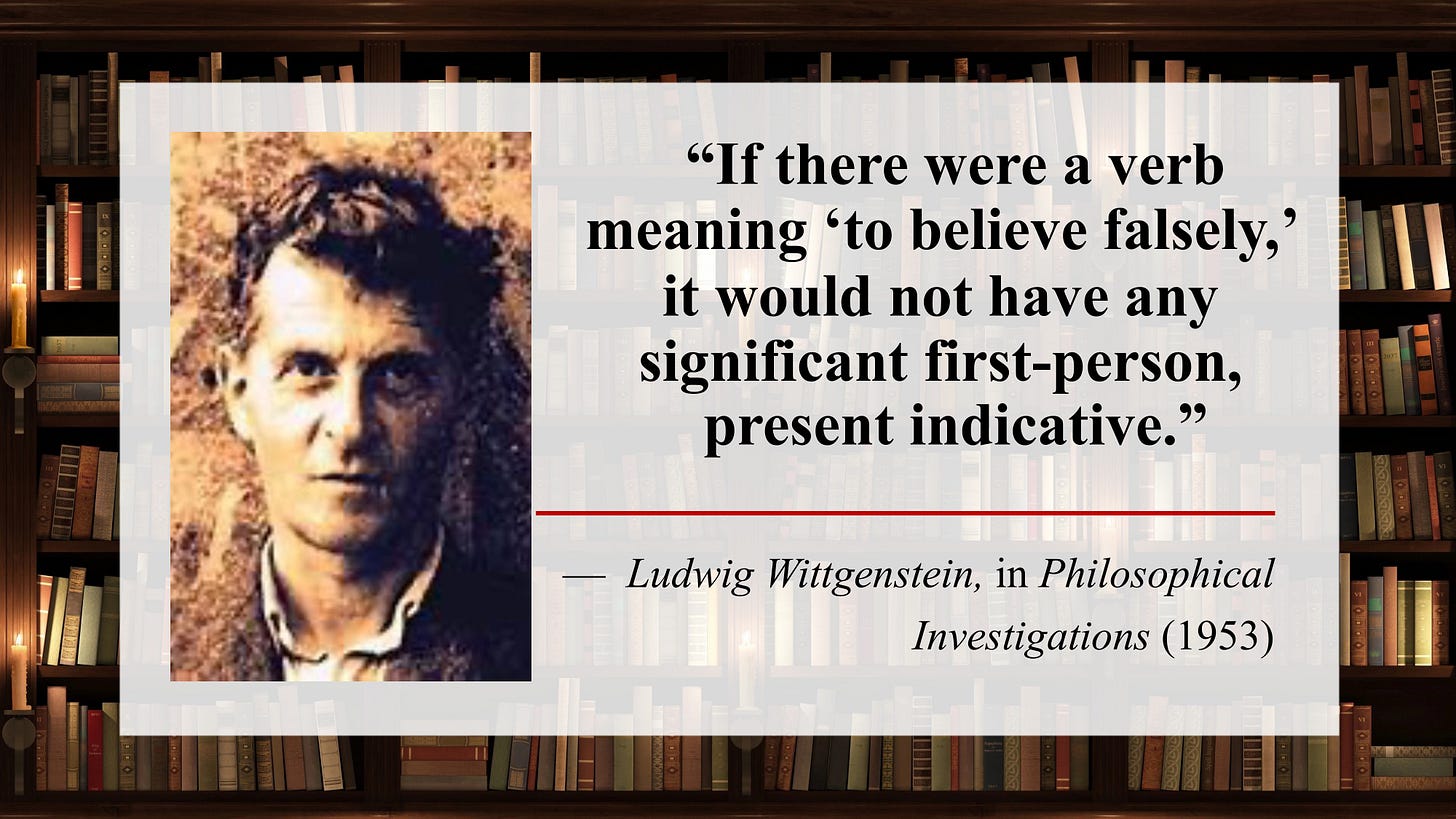
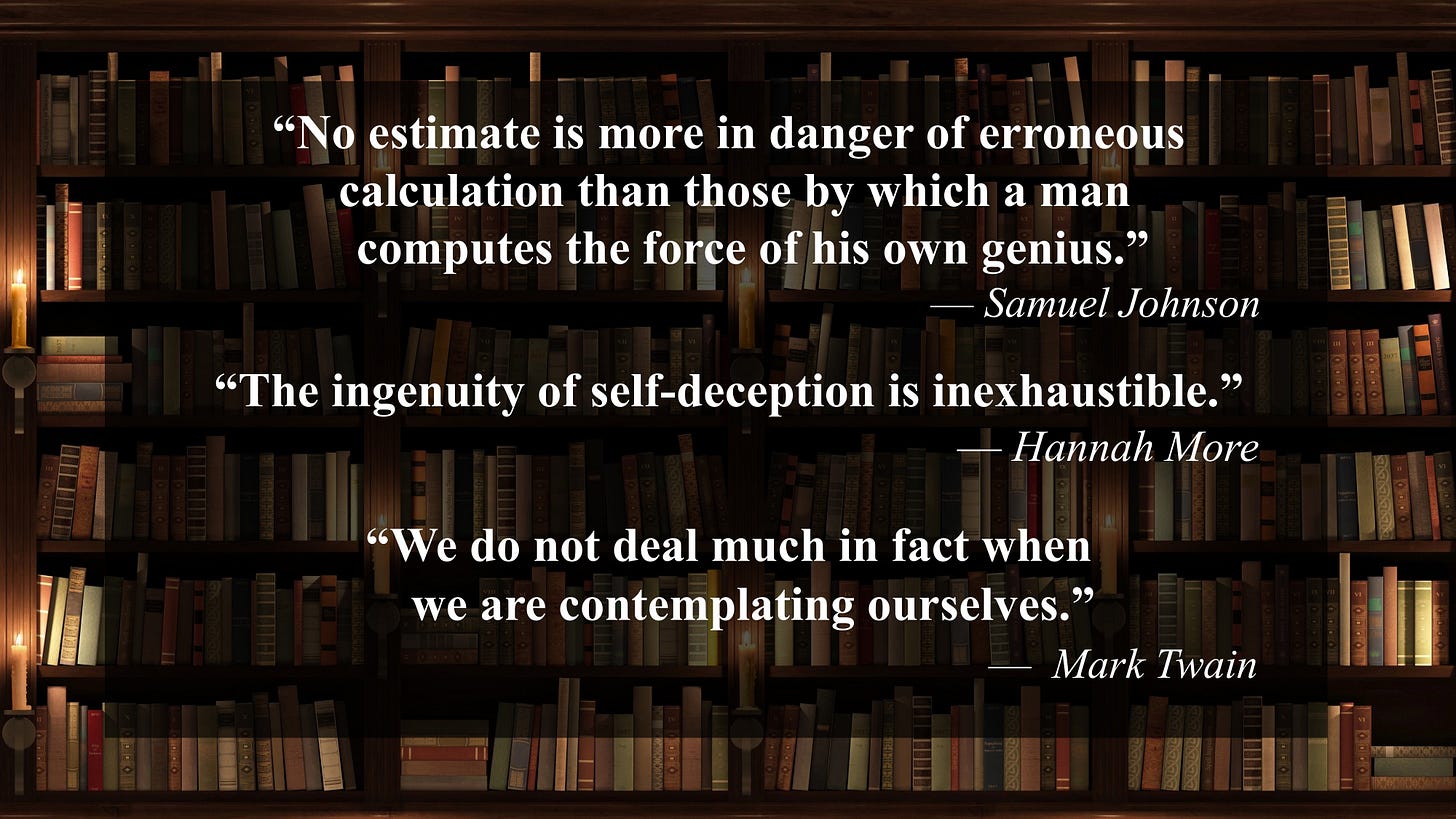
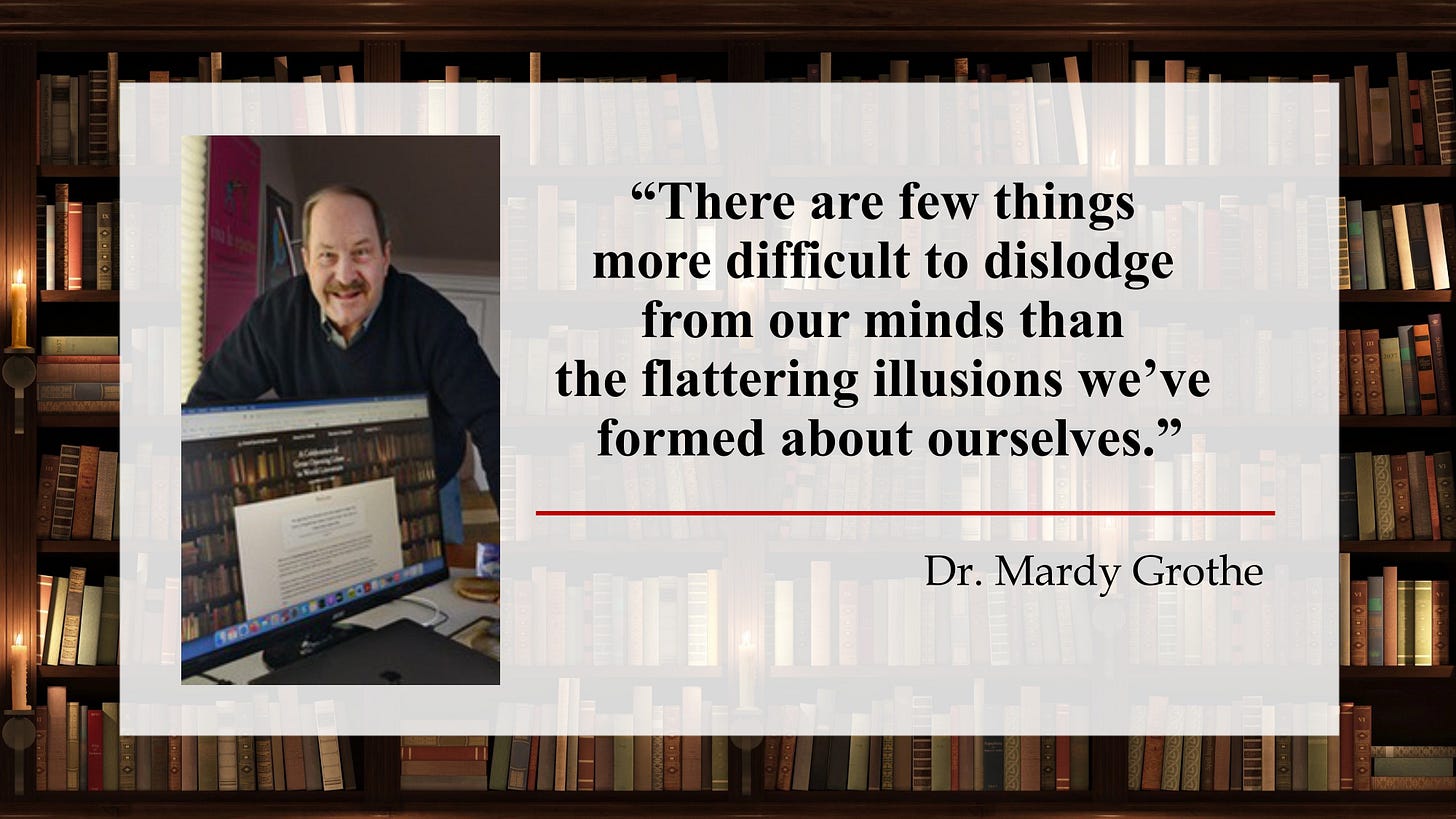
And along the same lines, in Lake Wobegone, all the children are above average.
Interesting that the assumption is always that a person is deceiving himself in a positive way. I was unable to find a term that describes the person who believes himself always unworthy, yet I have known such people. They are revealed not only by their words but even by their own actions.
Perhaps the lack of a term that means the opposite of narcissism reveals a collective self-deception of humanity. I also believe both narcissism and whatever that opposite term is have a common root: focusing solely on one's self.